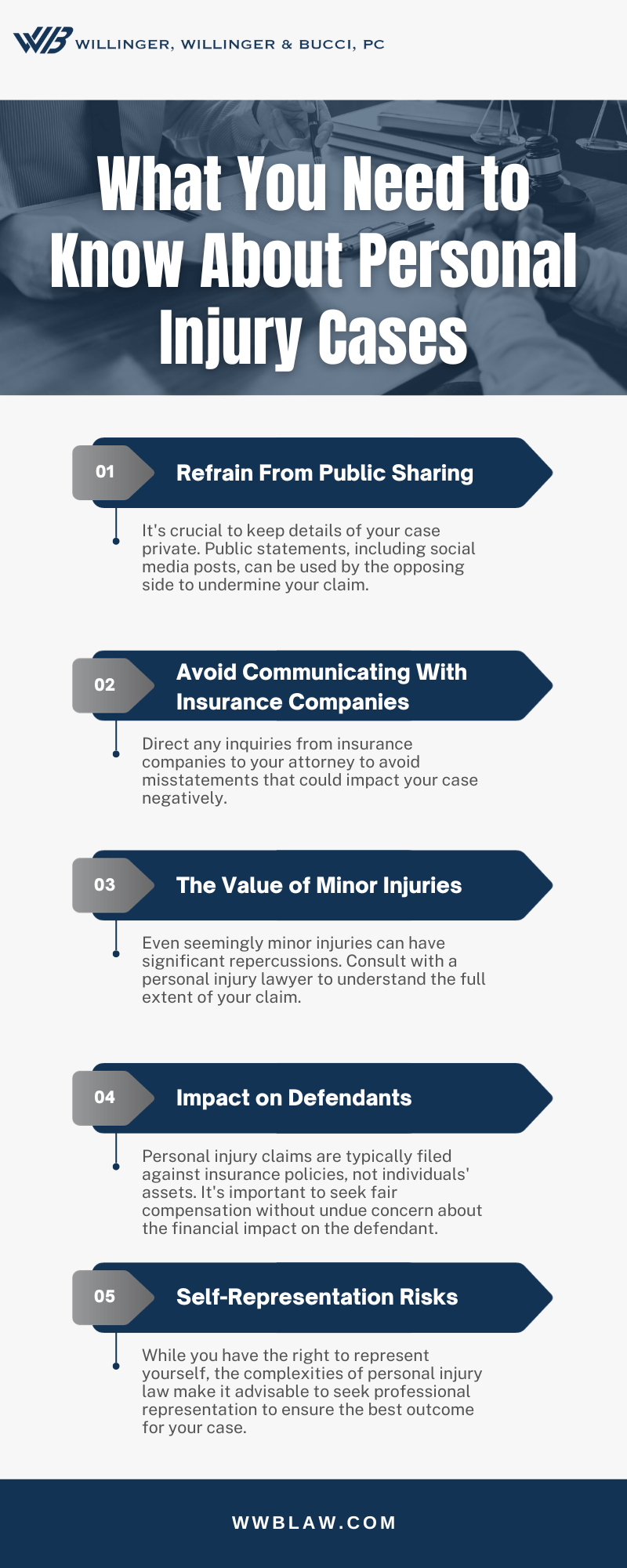Your Dedicated Personal Injury Attorneys
If you have been injured and are in search of an experienced Bridgeport, CT personal injury lawyer, our attorneys at Willinger, Willinger & Bucci, P.C. are ready to help.
When you suffer an injury because of another person’s negligence, you have the right to file a claim and be properly compensated for the pain and suffering that you have endured. An injury can significantly impact your life, putting you out of work and disrupting plans. It’s an inconvenience and burden that you should not go through alone. With our skilled personal injury lawyer’s assistance and support, you can get back to your life sooner. Your first consultation is free, so call our office now. You can trust our experienced team with your case.

The Compensation You Deserve
In the aftermath of a personal injury, you may be entitled to three types of compensation. Economic damages encompass calculable costs such as lost earnings, medical expenses, and property damage. Non-economic damages provide recompense for more subjective impacts, including pain and suffering, emotional distress that could lead to conditions like PTSD, disfigurement, and loss of life quality factors such as self-esteem or relationships. Lastly, punitive damages aim not to compensate but to penalize the wrongdoer and prevent similar misconduct. These are less common and highly specific to your case’s details and the applicable state laws. An experienced lawyer is crucial to assessing all potential compensations, particularly in articulating and justifying a claim for punitive damages, which are subject to stringent legal standards.
Financial Reimbursement For Your Medical Expenses
Accident victims often experience various types of losses due to their injuries, with medical expenses frequently having the most significant financial impact. The cost of medical treatments can be overwhelming, and even individuals with health insurance may struggle with deductibles, co-pays, and uncovered treatments or medications. Thankfully, Connecticut law allows accident victims to pursue personal injury lawsuits against those responsible for their injuries and related losses.
Our attorneys can evaluate your claim and determine the compensation you may be entitled to receive. The following medical expenses may be included in the damages our clients can claim in their lawsuit, depending on the type and severity of their injuries: emergency care, hospitalizations, surgery, rehabilitation services, mental health therapy, medications, medical devices, transportation costs, and more. This encompasses any ambulance or other emergency transportation needed from the accident scene to medical facilities, as well as any treatment received in the emergency room.
If our client’s injuries warrant hospital admission, this can be included in their lawsuit. It also covers any future hospitalizations required for injury treatment. If our client requires surgery following the accident or at any time in the future, they should be compensated by the at-fault party. Serious to severe injuries often necessitate stays at rehabilitation centers. These stays, as well as any outpatient physical and/or occupational therapy, are also covered. Accident victims may experience emotional trauma, leading to issues such as anxiety, depression, and PTSD that require mental health treatment.
What Else Can Be Included?
Any medication, including both prescription and over-the-counter drugs, should be covered in a personal injury lawsuit. Any necessary devices, such as wheelchairs, crutches, walkers, or canes, should be compensated. If our client has suffered an amputation due to the accident, all prosthetics are also covered. Any costs incurred by our clients to attend their medical appointments for their injuries are economic damages they are entitled to be compensated for.
The Duration Of Personal Injury Cases
The duration of personal injury cases can vary widely. While some cases settle within a few months, others could extend over several years. Influential factors include injury severity, the willingness of both parties to negotiate, court schedules, and the time needed for evidence collection. Cases that proceed to trial or encounter appeals can take longer. Your attorney will work to balance the goal of a timely resolution with the necessity of achieving adequate compensation for your injuries.
Personal injury victims have a limited window to pursue legal action, known as the statute of limitations. This period varies by state and the specifics of the case. For instance, Connecticut generally allows up to two years from the date of the injury for filing a claim, but certain circumstances could affect this timeframe. To ensure you understand the deadlines applicable to your case and to avoid the risk of forfeiting your right to claim, it’s crucial to consult with your lawyer promptly.
What To Do If The Insurance Company Offers You A Settlement
Despite internet ads and TV commercials that portray insurance companies as businesses that help you out in your time of need by paying your claims quickly and thoroughly, such, unfortunately, is not the case. In real life, insurance companies do everything possible to settle your claim for the least amount possible to preserve, if not enhance, their financial bottom line. What this means for you if you sustain injuries due to someone else’s negligence or wrongdoing is that you can expect to receive a phone call from the responsible person’s insurance company claims agent or lawyer shortly after the accident.
Believe it or not, sometimes you get this call while you’re still in the hospital receiving treatment for your injuries. The caller will probably sound sympathetic and concerned about you. Then, he or she probably will offer you a settlement amount slightly more than sufficient to cover your medical expenses to date.
All you need to do to get this money is sign a form releasing the insurance company from all further liability. Even though you’re probably already worrying about how you will pay your medical bills, which seem to be increasing almost by the minute, your wisest course of action is to politely decline the caller’s offer.
If you’ve already hired our Bridgeport personal injury lawyer, refer the caller to us. If you haven’t yet, take the caller’s contact information, tell him or her that you want to talk to your attorney before accepting any settlement, and expect a call from your lawyer as soon as you’ve had that discussion.
Initial Settlement Offers
Initial insurance company settlement offers are virtually always low. After all, if the caller can convince you to settle right now before you likely even know how long the consequences of your injuries will last or what treatment you may require in the future, they can put this claim to bed without paying out a great deal of money. Accepting an initial settlement offer is not in your best interests.
Types Of Personal Injury Cases
Personal injury is a broad field of law. A personal injury case is when a person suffers an illness or injury at the hands of a person or company that acted negligently, whether deliberately or not. They can be held liable if there is evidence found that links them to the act that resulted in direct harm to a victim. Some of the most common types of personal injury cases are:
- Car Accidents
Drivers who are not paying attention to their surroundings or casually disregard the safety of others around them can inflict harm on innocent victims. Victims can file a claim against negligent drivers.
- Motorcycle Accidents
Because of their small size and lack of sturdy protective barriers, cyclists often become personal injury victims when drivers fail to see or give them the right of way.
- Pedestrian Accidents
Personal injury lawyers often assist clients whom a driver has struck while they were walking on a sidewalk or crossing a street.
- Slip And Fall
A slip and fall can happen because of hazards like spilled liquids, malfunctioning equipment, or poorly maintained properties. Property owners can be held liable if they fail to remove the hazard or do not install a visible sign.
- Workplace Accidents
Cost-cutting employers can sometimes result in serious injury to workers. An employer can be held accountable if they violate safety measures and knowingly put workers at risk.
- Medical Malpractice
Doctors and healthcare professionals who breach their duty of care, resulting in harm to their patients, are often at the center of personal injury lawsuits.
- Product Defects
A product with a defect can seriously injure consumers. Examples of defects include technical flaws and insufficient instructions.
Bridgeport Personal Injury Infographic
Bridgeport Personal Injury Law Statistics
According to the U.S. Department of Justice, about 95 percent of personal injury lawsuits settle before they go to trial. This statistic shows that the vast majority of personal injury cases are resolved through settlement, rather than through a trial. There are many reasons for this, including the high cost of litigation, the uncertainty of trial outcomes, and the desire to avoid the emotional toll of a trial.
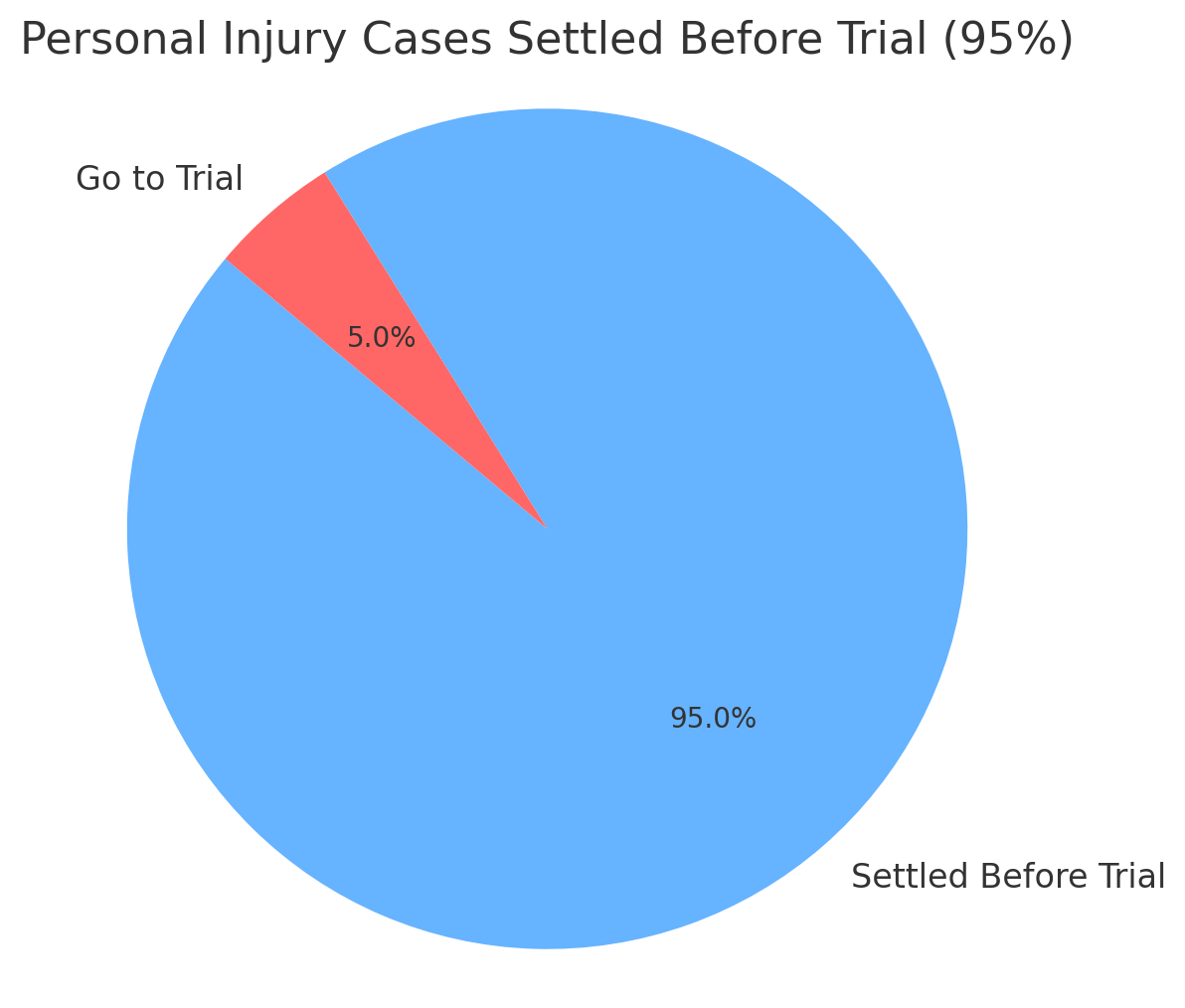
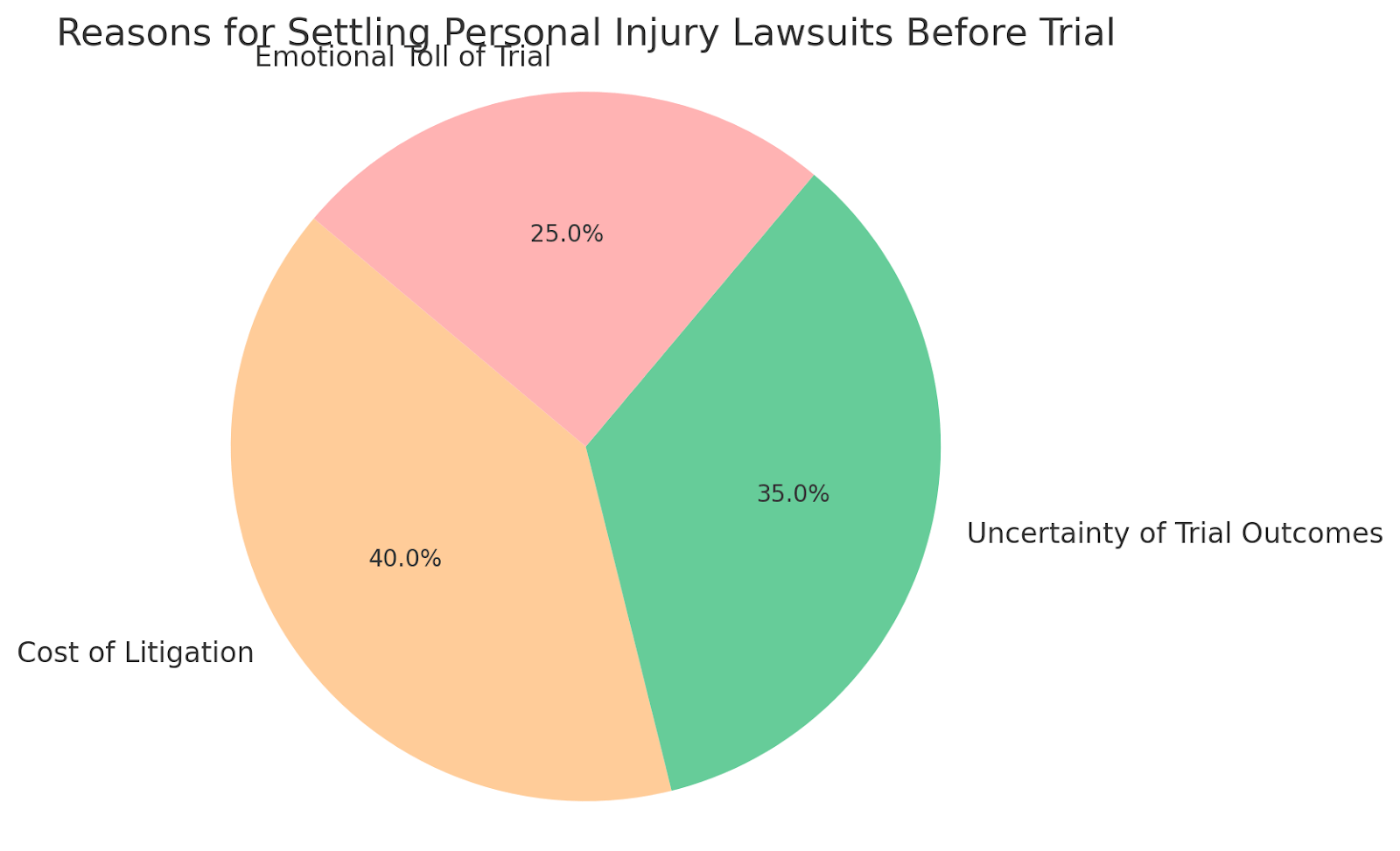
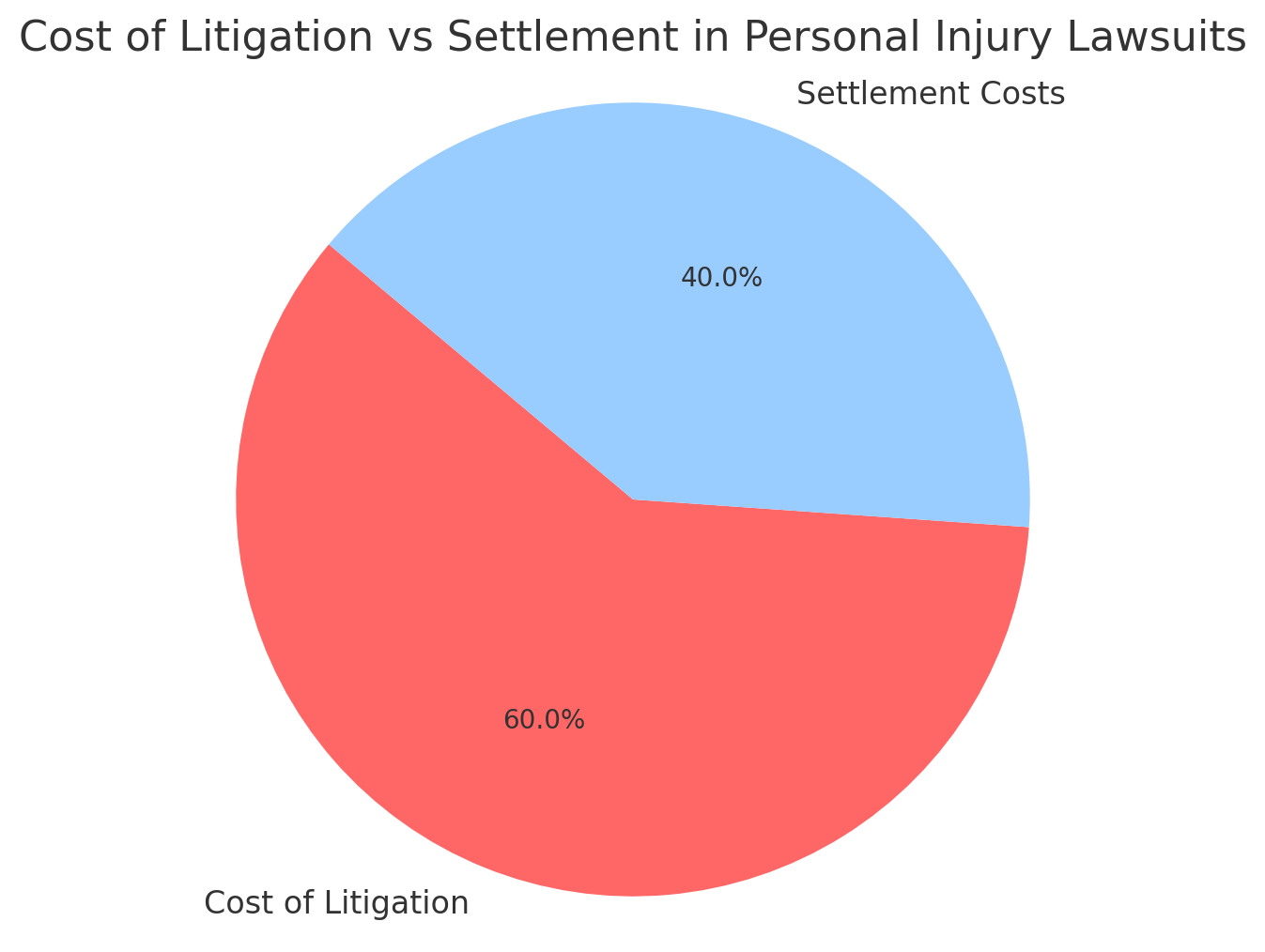
FAQs
What Is A Personal Injury?
A personal injury encompasses any harm caused to an individual due to another party’s negligence, recklessness, or intentional actions. This can include physical injuries, emotional distress, and financial losses stemming from various incidents such as automobile accidents, slip and fall accidents, medical malpractice, workplace injuries, and dog bites. Connecticut law allows injured parties to seek compensation for their damages, including medical expenses, lost wages, pain and suffering, and more, provided they can prove the other party’s liability.
How Long Do I Have To File An Injury Claim In Connecticut?
The statute of limitations for filing a personal injury claim is generally two years from the date of the injury. This legal timeframe is crucial because if you fail to file your lawsuit within this period, you may be permanently barred from seeking compensation for your injuries. However, there are exceptions and specific circumstances that can affect this deadline, such as injuries to minors or cases involving government entities, making it essential to consult with our personal injury attorney as soon as possible to make sure your rights are protected.
Can I Still Receive Compensation Even If I’m Partially Responsible For My Accident?
Yes, you can still receive compensation if you’re found to be partially at fault for your injury thanks to the state’s modified comparative negligence rule. Under this rule, you can recover damages as long as you are found to be less than 51% responsible for the accident.
However, your compensation will be reduced by your percentage of fault. For example, if you are awarded $100,000 but found to be 30% at fault, your compensation would be reduced to $70,000. It’s important to note that if you are 51% or more at fault, you will not be eligible to receive any compensation.
What Types Of Damages Can I Recover?
You may be entitled to recover a wide range of damages, divided into two main categories: economic and non-economic damages. Economic damages cover tangible losses such as medical expenses, lost wages, and property damage. Non-economic damages cover intangible losses, including pain and suffering, emotional distress, and loss of enjoyment of life. In some cases, punitive damages may also be awarded, but these are rare and reserved for cases where the defendant’s actions were particularly egregious or malicious.
How Does The Claims Process Work?
The personal injury claim process typically begins with a thorough investigation of the incident to gather evidence and establish liability. Once liability is determined, your attorney may send a demand letter to the at-fault party’s insurance company, detailing your injuries and the compensation sought.
If a settlement cannot be reached through negotiation, your attorney may file a lawsuit on your behalf. The case may then go through the discovery phase, mediation, and potentially a trial, where a judge or jury will determine the outcome. Throughout this process, having experienced legal representation is crucial to navigating the complex legal system and maximizing your chances of receiving fair compensation.
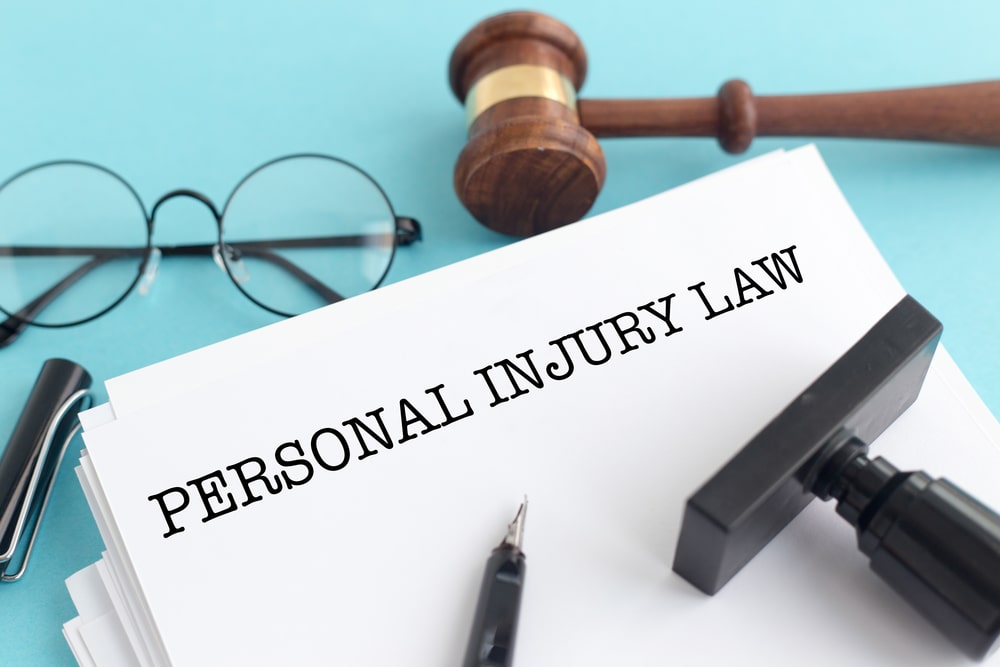
Bridgeport Personal Injury Glossary
At Willinger, Willinger & Bucci, P.C., our Bridgeport, CT personal injury lawyers are dedicated to helping victims of accidents and injuries secure fair compensation for their losses. Below, we explain important terms commonly encountered in personal injury cases, shedding light on what they mean and how they apply.
Personal Injury Claims Process
The personal injury claims process refers to the legal steps taken to seek compensation after someone has been injured due to another party’s wrongful actions. It begins with filing a claim, which involves gathering evidence like police reports, medical records, and witness statements. For example, if a pedestrian is struck by a distracted driver, the claims process might include proving that the driver’s behavior directly caused the injuries. At our firm, we work closely with clients to build a compelling claim tailored to their unique circumstances.
Contingency Fee Arrangement
A contingency fee arrangement means that a personal injury lawyer’s payment is contingent on the successful resolution of the client’s case. This structure allows clients to pursue justice without the upfront costs of hiring an attorney. For instance, if you are injured in a slip-and-fall accident at a grocery store, you won’t owe legal fees unless your case results in compensation. We believe this approach allows injury victims to access high-quality legal representation without financial strain.
Workers’ Compensation Benefits
Workers’ compensation benefits are available to employees who are injured while performing job-related duties. These benefits typically cover medical expenses and a portion of lost wages. For example, if a warehouse employee is hurt due to a malfunctioning forklift, they can file a workers’ compensation claim regardless of fault. In cases involving third-party negligence, such as equipment failure caused by a manufacturer, injured workers may also pursue additional compensation through a separate claim. We help clients evaluate these options and identify the best path forward.
Out-of-Court Settlements
Out-of-court settlements are agreements reached between the parties involved in a personal injury case without proceeding to trial. These settlements often involve negotiations between the injured party, their lawyer, and the at-fault party’s insurance company. For example, if a motorcyclist sustains injuries in a collision caused by a reckless driver, they may receive a settlement offer covering medical costs, lost wages, and other losses. At Willinger, Willinger & Bucci, P.C., we focus on obtaining favorable settlements while being prepared to proceed to trial if necessary.
Loss Of Consortium
Loss of consortium refers to the damages sought by the spouse or family member of an injured party for the loss of companionship, affection, or support. For example, if a severe car accident leaves a victim unable to maintain their prior relationship with their spouse, the spouse may pursue a claim for loss of consortium as part of the broader personal injury case. These claims are particularly emotional, and we work with families to ensure their voices are heard and their suffering is acknowledged.
If you or a loved one has suffered a personal injury, contact Willinger, Willinger & Bucci, P.C. to discuss your case. We’re here to protect your rights and advocate for the compensation you deserve.
Willinger, Willinger & Bucci, P.C., Bridgeport Personal Injury Lawyer
1875 Park Avenue, Bridgeport, Connecticut 06604
Contact Our Team Today
At Willinger, Willinger & Bucci, P.C., we have more than four decades of knowledge and experience in the personal injury litigation field. You can trust in our ability to maximize your damage award so that you can get your life back on track.
When you are injured because of someone else’s negligence, it can take a toll on your life, both mentally and physically. We understand that, and we want you to know that we will always be on your side fighting for you and that you deserve to return to life before your injury.
Our founding partners joined forces to create this law firm in 1990 and we believe in helping each client to the best of our abilities. We will always explain your rights to help you better understand your case and make informed decisions when it comes to advancing your case throughout its legal process. Call today to speak with one of our skilled personal injury lawyers.
Client Review
“Mark Middlen was an excellent lawyer, when I needed his expertise with my personal injury case. His professionalism, tenacity, (especially during Covid delays) made all the difference. His perspective, contacts, helpful staff and planning all contributed to a positive outcome. I would highly recommend him.”

